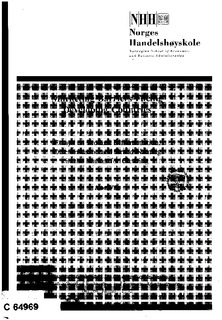| dc.description.abstract | Based on a statistical discrimination approach, in Market distortions due to
compulsory labelling of origin, it is argued that labelling improves the match
between consumers and producers to the extent that country of origin is an
indicator of quality, while labelling reduces the incentives for third world
producers to improve their quality. By implementing several experiments, in
Country of origin - a signal of product quality, it is found that the consumers
have negative perceptions of products from developing countries, while price
is used as the main screening device of product quality. Adopting a property
rights perspective on the firm, in Property rights, investment in product
differentiation and branding strategies in the market for clothing, several
control regimes are introduced and compared in order to secure that the party
which invests in differentiation is able to reap the profit of such (unverifiable)
investments. | en |
